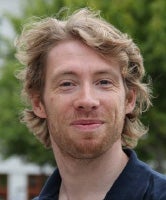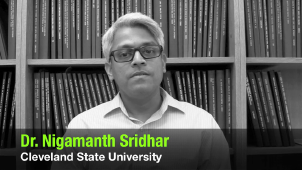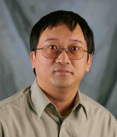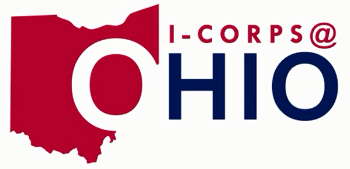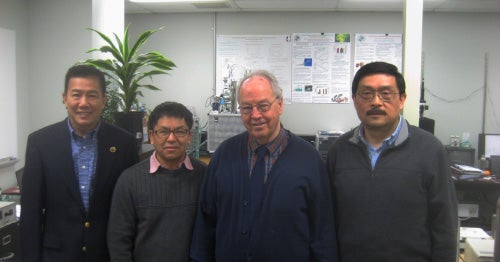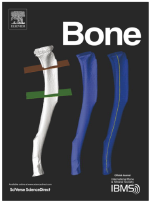 |
|
Dr. Thijs Heus Receives
Dr. Thijs Heus, associate college lecturer in the Department of Physics, has received a Department of Energy / Atmospheric System Research grant in collaboration with the University of Oklahoma (OU), with $228,000 for his part of the research. The project title is "Characterizing the Turbulent Structure of the Convective Boundary Layer Using ARM/ASR Observations and LES Model Output," and the project focuses on clouds and mixing processes in the lowest mile of the atmosphere, the so-called atmospheric boundary layer (ABL). This layer is a significant source of uncertainty in climate and weather forecasting, and it is also the key parameter in the spread of pollution through the atmosphere. Using a combination of radar and lidar measurements from OU, and high resolution computer simulations from Dr. Heus, this research will shed light on the causes of humidity variability at the top of the ABL, and on the onset of cloud formation. To perform the computer simulations, a grant worth 100,000 node hours was acquired from the Ohio Supercomputer Center (OSC). This research project began in August 2015 and is expected to conclude in July 2018. More information about the research project can be found here. Dr. Heus will begin a position as a tenure-track assistant professor at CSU in fall 2016.
Prof. Michael Baumgartner joined CSU in fall 2011 as a visiting assistant professor of musicology in the Music Department. In fall 2014, he accepted a position as an assistant professor. Prof. Baumgartner's research comprises Western art and popular music of the twentieth and twenty-first century, music's role in relation to the other arts (cinema, theatre, and visual arts), and the exploration of the narrative capacity of music. In his first book, (Exiled Goddesses: Female Statues in the Stage Works of Kurt Weill, Thea Musgrave and Othmar Schoeck, Georg Olms Verlag, 2012), Prof. Baumgartner explores a medieval tale about a Venus statue that comes to life and seduces a young man, and which is successfully set to music in the two operas The Voice of Ariadne (1974) by Musgrave, and Venus (1921) by Schoeck, and in the musical One Touch of Venus (1943) by Weill. The book offers a fresh look at the opera and musical production of the twentieth century by critically reassessing works from the early, middle, and late period of the century in a comparative and interdisciplinary analysis. Prof. Baumgartner continues to pursue his interdisciplinary approach to music studies with his second book project, Meta-Film Music in the Cinema of Jean-Luc Godard, which is under contract with Oxford University Press. This monograph will be the first extensive study in English of music and sound in the films of Jean-Luc Godard. The project proposes an alternative theory to analyze music in non-Hollywood cinema by suggesting that Godard's innovative and unorthodox use of film music generates rupture and tension between the music and images that invites the spectator/listener to actively interpret the meaning of the cinematic message. In addition to his books, Prof. Baumgartner has several active research agendas on other film music projects. He edits the essay collection Music in European Post-War Cinema with Prof. Ewelina Boczkowska (Youngstown State University). This project seeks to create a theoretical model for the music in European cinema during the post-war years leading up to the fall of the Berlin wall (1946-89). Prof. Baumgartner's research has been published in numerous collections, dictionaries (Musik in Geschichte und Gegenwart, and the Grove Dictionary of American Music), and journals (Jazz Perspectives).
Featured Researcher Video Series - Nigamanth Sridhar
Research by Prof. Nigamanth Sridhar is the focus of the latest installment of the Featured Researcher Video series. Prof. Sridhar is an associate professor in the Electrical Engineering and Computer Science Department. He earned his Ph.D. in computer science from The Ohio State University in 2004, and has been at CSU since then. Prof. Sridhar runs two parallel research programs. He directs the Dependable Systems and Networks Research Group, which studies topics that lie at the intersection of software engineering, programming languages, and distributed systems, with a special emphasis on small embedded systems such as wireless sensor networks. He also directs the CS Ed Ohio program, which studies topics relating to computer science education, both in higher education settings and K-12 schools. In 2008, Prof. Sridhar received the National Science Foundation Faculty Early Career Award, the only one ever received at CSU. His research has resulted in two book chapters and over 50 research papers in conferences and journals. We encourage you to learn more about Professor Sridhar's research and to take a look at our previous Featured Researcher Videos.
Prof. Wenbing Zhao is an associate professor of in the Electrical Engineering and Computer Science Department. Prof. Zhao has a broad interest in theoretical and applied computer science, including distributed systems, secure and dependable computing, pervasive computing, computational intelligence, and health informatics. Prior to 2013, Prof. Zhao's research focused on efficient and robust fault-tolerant distributed systems, which are important for the dependability and trust of cloud-based computer services. Dr. Zhao investigated various approaches to enabling concurrent computer processing. His research was supported by a CSU FRD award, a CSUSI (now called FSI) award, and an NSF grant. In addition to several dozen research papers, Dr. Zhao published a research monograph in 2014 titled Building Dependable Distributed Systems, which documented his insights and his primary research findings. In recent years, Prof. Zhao has adjusted his research to focus more on application, particularly in the area of health care, to better align with the CSU mission and priorities. In collaboration with colleagues in the School of Health Sciences and the School of Nursing, Dr. Zhao developed several Microsoft Kinect-based systems for human motion tracking for the purpose of automated real-time monitoring of rehabilitation exercises done by patients at home, and of the body mechanics of health care workers. The former application has the potential benefits of lowering the cost of physical therapy and increasing the quality of patient exercises. The latter application helps reduce the risk of lower back injuries among health care professionals. Prof. Zhao's unique technology enables selective tracking of individuals using programmable cameras, and has led to a provisional patent that was filed by CSU in June 2015. Prof. Zhao's research is currently supported by a grant from the Ohio Bureau of Workers' Compensation (and previously by the CSU FRD program and the CSU Undergraduate Summer Research Award Program). Prof. Zhao's system will be deployed at the Jennings Center for Older Adults later this year. Prof. Zhao's long-term goals are to understand fundamental modalities in human-computer interactions, and to improve human behavior using pervasive computing technologies.
News from the Technology Transfer Office Lee Patent Filing: A U.S. provisional patent application titled "3d-Printed Miniature Biological Constructs" was filed by CSU on behalf of Dr. Moo-Yeal Lee from the Department of Chemical and Biomedical Engineering. The invention claims to develop new biological constructs that are highly automatable, and to provide for high-throughput microarray screening platforms, instruments, and devices that can be used for biochemical and cell-based assays to assess human metabolism and toxicology. The technology is also the subject of a NIH R01 proposal that was submitted in October 2015. Material Transfer Agreement (MTA) Update: CSU has entered into a three-party MTA with Eli-Lily and the FDA on behalf of Dr. Anton Komar from the Center for Gene Regulation in Health and Disease (GRHD), and the Department of Biological, Geological and Environmental Sciences (BGES). The MTA will allow Dr. Komar to investigate potential impact of synonymous mutations on a structure and function of the Eli-Lilly model monoclonal antibody. CSU has entered into an MTA with Boston Children's Hospital (BCH) on behalf of Dr. Yana Sandlers from the Department of Chemistry. The MTA will permit Dr. Sandlers to research pluripotent stem cells provided by BCH.
Start-Up Companies: Dr. Ye Zhu from the Department of Electrical Engineering and Computer Science is leading the first team from CSU to register for the I-Corps@Ohio program. Dr. Zhu's executive summary will be reviewed by program leaders, and if approved, a full response to the RFP will be requested. In addition to receiving an award of $15,000, I-Corps@Ohio teams develop scalable business models that attract seed, angel, and venture funding to support company formation and market entry.
The Office of Research is pleased to provide the following reminder for the 2016-2017 internal funding programs.
The DRA and FSI programs have significantly changed since last year and now allow summer salary. In order to assist in the preparation of successful applications, the evaluation forms that will be used to evaluate the proposals are included at the above web sites. For more information, please contact Joy Yard, 687-9364, j.yard@csuohio.edu, or Dan Simon, 687-5171, d.j.simon@csuohio.edu
Professors Yau, Zhou, Lam, and Fox Receive $75,000 MIRP Award Professors Siu-Tung Yau (College of Engineering), Aimin Zhou (College of Sciences and Health Professions), Eddie Lam (College of Education and Human Services), and Harry Fox (College of Engineering), have been granted a $75,000 Multi-College Interdisciplinary Research Program (MIRP) award from the Office of Research. MIRP awards fund broad, interdisciplinary, collaborative research activities that involve faculty from multiple colleges at CSU. The team's research builds on previous results from Prof. Yau, who has invented and patented an ultrasensitive molecular detection method, and Prof. Zhou, who has discovered a novel urine-based biomarker for the diagnosis of liver cancer. The research team proposes to develop an inexpensive, hand-held device capable of detecting extremely low concentrations of disease biomarkers in urine. Prof. Fox will provide the technology expertise to design a prototype of the meter, which will have an expected cost of less than $200. Prof. Lam will conduct a survey in Cleveland and across the nation on the applicability and demand of the device for the detection of traumatic brain injury among high school football players. The research team plans to use the MIRP award to collect preliminary results for external funding from the National Institutes of Health and the American Cancer Society.
CSU Research Leads to New Initiative by President Obama
On January 30, President Obama called for a new initiative entitled Computer Science for All, and has requested $4 billion of funding in his budget request to Congress. This new initiative is partially based on a National Science Foundation program called CS10K. In 2013, this program awarded CSU a $1 million grant, which is being led by Profs. Nigamanth Sridhar, Debbie Jackson, Karla Hamlen, and Santosh Misra (retired). This program is one of the key factors that contributed to this bold and broad initiative from the White House. Since beginning their grant, the CSU team has made significant strides in promoting computer science across Ohio. They have developed curricula for the new Advanced Placement Computer Science Principles course, which is being launched in the 2016-17 academic year by the College Board. They have worked with 23 different schools across Ohio (Northeast Ohio, Toledo, Springfield, Dayton, Southern Ohio, Mid-Ohio), and have trained teachers from each of these schools. These teachers are now teaching the Computer Science Principles course to over 500 students across the state. This coming summer, the CSU team will work with an additional 25-40 teachers from across Ohio. CSU is among a very small number of institutions of higher education leading the charge on promoting computer science education, which will have a significant and lasting impact on K-12 education in the coming years.
CSU Research Featured in Nature Reviews Rheumatology
A recent paper by Prof. Roman Kondratov in the journal Bone has been highlighted in Nature Reviews Rheumatology, which is one of the top rheumatology journals in the world with an impact factor of 9.8. Dr. Kondratov, a professor in the Center for Gene Regulation in Health and Disease (GRHD) and the Department of Biological, Geological, and Environmental Sciences (BGES), has studied the relationship between bone physiology and the circadian clock. Prof. Kondratov has shown that impairing the molecular clock by inactivating certain proteins in mice leads to osteopenia, which contrasts with previous studies. "The current study unambiguously establishes that the absence of the protein BMAL1 is associated with a low bone mass phenotype, which correlates with an increased risk of osteoporosis following circadian disruption through shift work in humans," Prof. Kondratov explains.
Improvements in SPRS Research Administration Researchers whose work includes human participants have been able to use Cayuse IRB, a completely online system for protocol creation, submission, review, and management, for nearly a year now. Cayuse IRB has eliminated the need for paper and reduced the amount of time required for routing and approval. SPRS has also started using eFileCabinet, a document management application, to transition from paper records to electronic records for grant administration. The post-award office has been using Billing and Accounts Receivable PeopleSoft modules for several months now, which include a custom-designed invoice printing process that was developed by CSU. Many post-award functions were previously performed manually, but the use of the software modules is significantly more efficient, allowing for faster tracking of billing and invoicing data. SPRS is also in the process of designing an automated summary sheet that can be used by project directors to track budgets, expenses, and other useful information about their grants. Additional information about this service will be publicized soon.
Reminder of NIH and NSF Changes We recently notified NIH-funded PIs regarding changes to NIH research grant applications as of January 25th, 2016. In the November 2015 issue of the Research Newsletter we notified readers about changes to NSF policies and guidelines as of January 25th, 2016. NSF proposal guidelines are available in the Proposal and Award Policies and Procedures Guide (PAPPG, NSF 16-1). As of January 25th, organizations are not able to submit proposals to NSF FastLane after 5:00 p.m. on the proposal due date. The cutoff time is determined by the submitter's local time zone. _____________________________________________________________________________ Please share with us important news or updates on your research, scholarly, or creative activities. Updates may be related to a paper that has been accepted for publication in a high-impact journal, a book you've just published, your work that will be exhibited at a prominent institution, or other updates you wish to share with our office. Send details to j.yard@csuohio.edu and d.j.simon@csuohio.edu. _____________________________________________________________________________
This newsletter is compiled and published by |
|||||||||||||||||||||||||||||||||||
|
|||||||||||||||||||||||||||||||||||
 | |||||||||||||||||||||||||||||||||||
|
© 2016 Office of Research - Cleveland State University |
